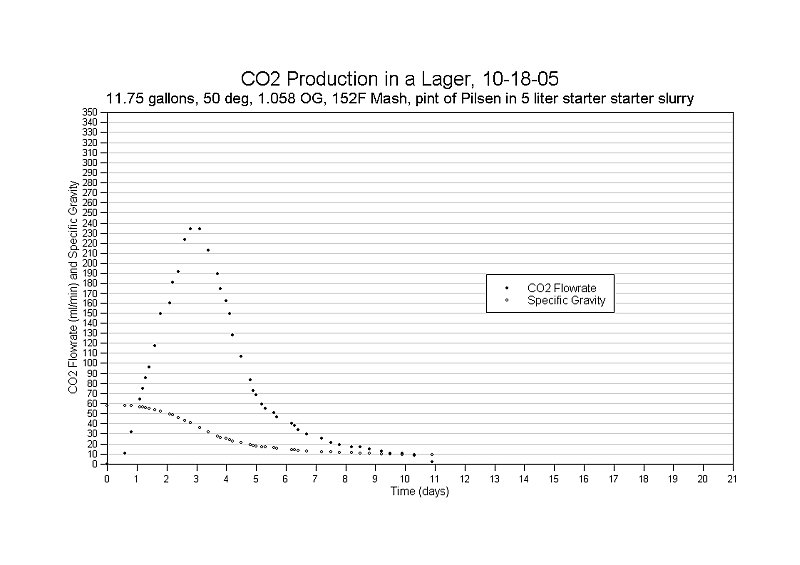And how does an airlock that may or may not bubble, or can bubble slow, or fast or not at all, can start and stop due to changes in barometric pressure, temperature, or whether or not the cat or vacuum cleaner bumped into it, help you to know how or even if a brew is fermenting at any given time? Half the time my airlocks NEVER bubble. And sometimes the lowest gravity beer will have an airlock blowoff whereas I could be brewing a barleywine that barely bubbles?
Bubbling and fermetnation are NOT the same thing. And you really need to separate the two ideas. Airlocks tell you the WHAT is happening, that co2 is or isn't getting out of the fermenter....but they aren't telling you the WHY. If it's fermenting or not, or off gassing or not. If it's done or not....
A HYDROMETER is the only indicator of how a beer/wine is doing at any given time. An airlock is purely a vent, a VALVE to release built up co2, it's not a "magic fermentation gauge."
Airlock activity is irrevelent. Just gravity points on a hydrometer.
The rate or lack of or whether or not it bubbles at all, or if it starts and stops has more relation to the environment the fermenter is in, rather than fermentation itself. All it is is a vent, a valve to let our excess gas, especially co2, nothing else. It's not a fermentation gauge whatsoever.
And the only TRULY airtight fermenters out there are if you ferment in a keg or a conical, something that can contain the pressure of fermentation.
Contrary to what you may think, neither a bucket OR a carboy with a bung is airtight. As I stated above you don't want it to be airtight, unless it's a keg or a Stainless conical, unless you like beer/ wine on your ceiling.
The airlock is one of the most superfluous things in brewing, that new brewers seem to put the most stock in.
I've said it over and over and trolls like to try to get me, or even accuse me of lying (which I don't get why I would lie about something like this) but over the years of LOTS of batches of ALL SIZES and BOTH carboys and buckets, better bottles or glass, carboy caps or bungs, new buckets old buckets, s-types and 3 piece, I get about 50% airlock failure rate (but 100% success rate of fermentation) and it's any number if things, usually simply a non tight seal in the bucket or carboy or grommet....but to me the reason doesn't matter....the point is just trying to glance at an airlock and know what the beer is doing, just is NOT accurate.
My belief is that 1 occurrance is an anamoly, 2 may be a coincidence, BUT 3 or more occurance is an epidemic...and that's the case for folks relying on airlocks all the time, to me if 1 brewer comes on saying his airlock is not bubbling, AND he takes a reading and finds fermentation is going fine, that's an anamoly...
But DAILY on here there are at least 10 threads stating the exact thing...so MAYBE there is something to this idea that airlocks can be faulty. AND if they have the potential to be faulty, then how can we trust them to tell us what's going on?
You can quibble about it all you want, or deal in semantics, but we deal in sheer volume of users on here, and daily we have airlocks not bubbling, and many of them where a gravity reading indicates that fermentation is happening beautifully.
And yes, in an IDEAL situation (like let's say fermenting in a keg with a tight seal and no leak from around the airlock) the airlock SHOULD bubble 100% of the time (providing there's not too much headspace.) If more co2 is created than can be contained in the spavce of the fermenter, THEN an airlock should bubble....because an airlock is a valve.
But MOST of us don't have IDEAL situations, and rarely is a plastic or glass fermenter airtight- it really isn't supposed to be anyway...SO we aren't in the best situation to have IDEAL 100% accuracy of an airlock...
So that's why it's a good idea NOT to relie on or stress out about what it is or isn't doing. Just realize that airlocks bubble or they don't, they start, they stop, they bubble fast, they bubble slow, and they bubble or don't whether fermentation happens or not.
Like I said, the only accurate thing that will tell you what your beer is or isn't doing, is taking gravity readings.
So tell me again how this is an important brewing device?






